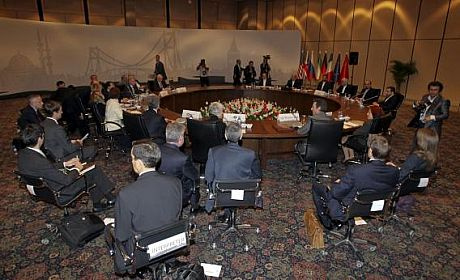Iran, IAEA Move Apart on the Verge of Agreement

It seems that despite initial optimism on reaching an agreement on the modality, Iran and the IAEA have not reached a desirable result. What is the reason, in your opinion, behind this lack of achievement?
These types of negotiations take a long time, for the issue is very complicated and technical. We can therefore not expect all the issues to be resolved in one session. What is important to know is whether the negotiations are moving forward or not? It seems that these negotiations are moving forward. At the present time, there are two versions of these negotiations. One version is the version of Mr. Soltaniyeh who has said that Iran and the IAEA have reached an agreement on some items but no agreement has been made over other items such as visiting the Parchin site. The second version is the version of Mr. Nakartz. He has stated in Vienna that they have not been able to finalize the modality. This does not necessarily mean that there is a contradiction between these two statements. It means that agreements have been made in certain areas but the two parties could not finalize the document, thus, we must wait for the next session.
Isn't the fact that no date has been determined for the next negotiation indicative of the defeat of Iran-IAEA negotiations?
Basically, using the term defeat is not suitable for these negotiations. These negotiations need time. It is true that 8 sessions of negotiations have been held, but only the last three ones were serious and had a framework for discussions. Therefore, one can hope that agreements will be made in future sessions. Of course there is the possibility that the other party has made the negotiations difficult for they did not want Iran to go to Almaty with a full hand, and if Iran had reached an agreement with the IAEA, it could have attended the next round of negotiations with a better hand. It is expected that if Iran reaches an agreement with the P5+1, it will be able to reach an agreement with the IAEA as well. But today Reuters has published a report that the western party intends to suggest in the next negotiations that Iran shut down Fordow in return for the removal of sanctions on precious stones. If true, this news is very disappointing.
Does it mean that the removal of sanctions on precious stones will not change Iran's situation?
The western party had three requests before. But it has now placed all these three requests in one request and that is the shutdown of Fordow. When they propose the issue of Fordow, considering the fact that Iran now executes 20% enrichment in Fordow, shutting down this site will move them towards their initial goal, i.e. the suspension of 20% enrichment, unless a section of Natanz is once again allocated to 20% enrichment. Secondly, the issue of the exchange of enriched uranium with their transformation into fuel plates will be meaningless. Thus, shutting down the Fordow site which does not have any legal merit is an extraordinary demand. Fordow's activities are under the 24 hour supervision of the IAEA. Shutting down this site is not legal. Nevertheless, Iran, in order to show its good will, can perform 5% enrichment in these installations.
But the exchange proposal is not very interesting. The sanctions which are promised to be removed are the same ones which have been enforced since February 5th. What is the logic behind it? They do not observe the issue of proportion between the given concessions and the ones received. These positions show that they are not willing to reach an agreement in the negotiations.
One of the issues which was proposed prior to the visit of the IAEA inspectors to Iran was the issue of new centrifuges in Natanz. What are the functional differences between these centrifuges and the previous ones and why has it caused sensitivity for the Europeans?
When Iran sees that they intend to continue the policy of pressure and negotiation, they feel that it is better for them to reveal their progresses. The westerners are continually increasing the level and extent of the sanctions. Then they base their political bargaining on these sanctions in the negotiations and use it as leverage for pressure against Iran. Iran is then forced to increase its bargaining power through increasing the number of centrifuges or promoting their quality.
The functions of the third generation centrifuges are two to three times more than the first and second centrifuges. Iran increases the speed of uranium enrichment through this method. This will then increase Iran’s bargaining power. This is the policy pursued against their policy. If they intend to change the conditions, they must review this policy. This is while these measures are not against international laws.
As you mentioned, Mr. Soltaniyeh has stated that agreements were reached on some points of the modality. Why is there no emphasis on these agreements?
They do not want to be trapped by media sensationalism. One of the problems which has led to the prolongation of these negotiations is the sensationalism of the western media. The western media highlight those points which are to their benefit. In order to prevent media involvement, both sides intend to reveal the agreement when it is finalized.

